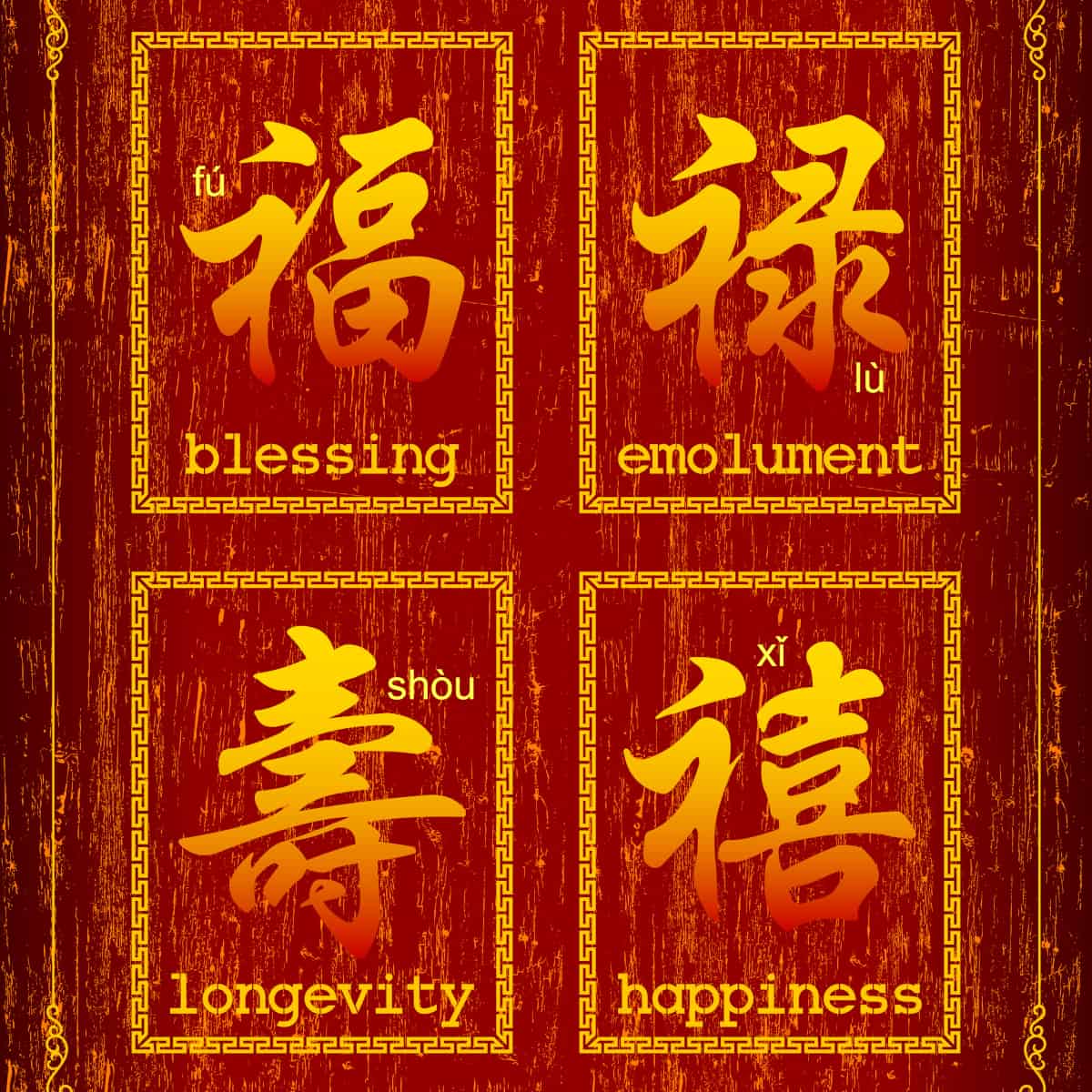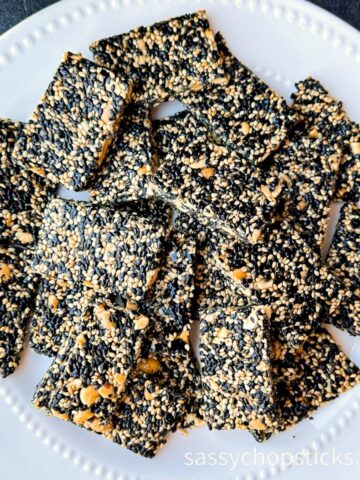China is rich in culture and traditions; its written language is no exception. The Chinese writing system, consisting of thousands of characters, is visually fascinating and deeply rooted in symbolism and meaning. One such character that holds great significance is the character for "good fortune" or "good luck."

Jump To
The Chinese character for good fortune, known as “Fu,” holds great significance in Chinese culture. As one of the most popular Chinese characters, it is commonly seen during the Chinese New Year celebrations, and it represents good wishes and hopes for a good and prosperous year ahead. Read on to learn about its rich history, symbolism, traditions, adoption in Western culture, and more. We will also explore the Chinese character of good fortune and delve into its cultural significance.
Chinese Character Fu: "福" (fú) – Meaning and Symbolism
The character Fu carries profound meaning and symbolism in Chinese culture. The literal translation of Fu is “good fortune” or “blessing.” It embodies the concept of good luck, prosperity, and blessings. The character is visually striking, composed of two parts: the radical on the left represents "altar" or "shrine," and the radical on the right signifies "good" or "auspicious." When combined, these radicals create a powerful symbol of blessings and prosperity. The character Fu is highly treasured and revered because it represents the desired state of well-being and happiness.
History and traditions
The origin of this Chinese lucky character dates back to ancient times. Fu has been used for centuries in many forms of art and calligraphy. It gained immense popularity during the Ming Dynasty when it was incorporated into the imperial seal of the Emperor. Since then, the Fu symbol has become an integral part of Chinese New Year festivities, Chinese weddings, etc., because it is believed to bring good fortune and ward off evil spirits. Chinese people commonly display the character Fu on red paper and paste it on the window or front door to invite prosperity and luck into homes.
Fu in western culture
In recent years, Fu has garnered recognition and attention in Western culture. As more and more people become fascinated by Chinese symbolism and traditions, the character Fu has found its way into various Western contexts. It can be found in fashion accessories, home décor items, birthday cards, main door ornaments, and even tattoo designs. Westerners often embrace the character’s propitious meaning and include it as a symbol of positivity, prosperity, and hope.
Fu and Feng Shui
The character Fu holds great significance in the realm of Feng Shui, the ancient Chinese practice of harmonizing energy to bring prosperity and balance into one’s life. In Feng Shui, Fu is considered a powerful symbol for attracting positive energy and good fortune. Its placement and usage play a key role in harnessing the chi and creating a harmonious environment. The Fu character is often incorporated into Feng Shui practices as a means to attract prosperity, blessings, and abundance.
The significance of writing Fu upside down
One interesting aspect of the Chinese character 福 is that it is often written upside down. This practice originates from a Chinese wordplay, as the phrase “Fu dao le” sounds similar to “fortune has arrived” in Chinese. By intentionally inverting the character, it symbolizes the arrival of good fortune. That’s why it is a common practice to display/write Fu upside down during the Chinese New Year.
Ways to use Fu to bring good fortune
There are several ways to use Fu to invite good fortune into one’s life. Apart from writing it upside down, you can include the character in many decorative items, such as lanterns in color red, red paper cuttings, and couplets. These decorations are believed to attract positive energy and drive away negative influences. It is also often written in calligraphy to enhance its aesthetic appeal. The character is believed to bring blessings, happiness, and prosperity to those who encounter it.
Apart from this, you can also wear clothing or accessories adorned with the Fu character during the festive season to bring prosperity and good luck. Writing Fu on red envelopes when giving money as gifts during Chinese New Year is also a common practice.
Additionally, when the Chinese New Year comes, it is a time when this character for good fortune takes center stage. It is customary for families to hang red banners or scrolls adorned with the character on their doors or walls. This practice is believed to usher in good luck for the upcoming year and ensure a prosperous and joyful time for all.
Superstitions and beliefs
The Chinese symbol Fu, associated with prosperity and good fortune, has given rise to various superstitions and beliefs in Chinese culture. Some of these include the following:
- The color of Fu: It is believed that the Fu character should never be displayed in black or written in black ink as black is considered a bad omen and associated with mourning.
- Blessing the olderly: In some Chinese regions, it is customary for the younger generation to pay respects to elderly people by presenting them with artwork or calligraphy pieces featuring the Fu character.
- Renewing Fu every year: Some families believe the Fu character should be replaced annually. Since the Chinese New Year marks a fresh start, it is customary to remove the previous year’s Fu and replace it with a new one to ensure continuous good luck and blessings throughout the year ahead.
The Chinese word/character Fu encapsulates the desire for abundance, good fortune, good health, and long life. As one of the most popular Chinese good luck symbols, it has become an integral part of Chinese culture. Whether displayed upside down, used in decorative items, or embraced as a personal symbol, Fu is a powerful reminder of the universal desire for prosperity and well-being.
Other positive Chinese characters
In the Chinese language, the pronunciation of "福" (fú) sounds similar to the word for "blessing" or "happiness." This linguistic association further enhances its symbolic significance. Additionally, the character is often paired with other positive Chinese characters, such as "寿" (shòu) for longevity or "财" (cái) for wealth, to create meaningful phrases or expressions that encapsulate people's aspirations for a well-rounded and fulfilling life. Some other positive Chinese characters include:

禄 (lù): This word has several meanings depending on the context. In ancient China, it referred to an official's salary or income. It also represents good fortune, blessings, and prosperity. In some contexts, it can refer to the concept of happiness and contentment.
禧 (xǐ): This word signifies "happiness" or "joy." It is often used in the context of celebrations and auspicious occasions. The character 禧 is frequently seen in traditional Chinese New Year greetings, expressing wishes for a joyful and prosperous year ahead.
钱 (qián): This word means "money" or "currency" in general. It can refer to both coins and paper money.
金 (jīn): This word means "gold" or "golden." It represents precious metal and is often associated with wealth, prosperity, and luxury.
宝 (bǎo): This word has multiple meanings, including "treasure," "precious," or "gem." It can refer to valuable items, precious objects, or something highly cherished.
Conclusion
In conclusion, the Chinese character for good fortune, "福" (fú), is an iconic symbol deeply ingrained in Chinese culture. Its visually appealing design and auspicious meanings make it a cherished representation of blessings and prosperity. Whether displayed during festive occasions or incorporated into daily life, this character serves as a powerful reminder of the aspirations and hopes shared by people around the world.
In recent years, the character for good fortune has gained global recognition and popularity beyond Chinese-speaking communities. Its elegant design and auspicious connotations have made it a sought-after symbol for various purposes. From tattoos and artwork to decorative items and gifts, the character has found its place in diverse cultural contexts, serving as a reminder of the universal desire for prosperity and well-being.
So, next time you encounter the character for good fortune, take a moment to appreciate its beauty and the rich cultural heritage it embodies. May the character "福" bring you boundless blessings and open doors to a future filled with good fortune!

















Leave a Reply